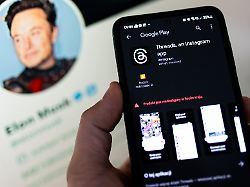Platform declared dead lives
Is Zuckerberg killing Twitter?
By Max Borowski
7/6/2023 8:27 am
Despite the dissatisfaction of many Twitter users, no competitor of the platform has been able to become really dangerous. Now Elon Musk’s archrival Mark Zuckerberg is trying his luck with the new app Threads. It has one distinct advantage and one disadvantage compared to other Twitter alternatives.
Ever since Twitter was bought by the world’s richest man, speculation has been rife about the social network’s demise. Almost every decision made by the new owner Elon Musk was followed by a wave of criticism and the announcement by many users that they would switch to alternative services. However, only a few actually left. Musk’s archcompetitor Mark Zuckerberg, with his network company Meta, is probably the only one who has a realistic chance of dealing the death blow to the ailing short message service. The new meta app “Threads” has now been launched. Zuckerberg has one distinct advantage—and one disadvantage—over other at times hyped Twitter alternatives.
Musk’s assertion in the spring that user activity on Twitter had reached a new record high is likely to be at least a selective representation. Attempts to generate new revenue through the sale of Twitter Blue subscriptions have not yet met expectations either. But none of the competitors repeatedly brought up as alternatives has been able to entice away a significant number of users from Twitter – until now. Measured by its 6.6 billion visits, i.e. visits by users, according to the web data provider Similiarweb as of May, Twitter is still one of the most widely used websites in the world.
Meanwhile, the sequence of apparently erratic decisions by Elon Musk is not coming to an end. He recently announced that he would limit the number of tweets that users can read every day – but less drastic for paying members than for normal users. Twitter content is generally only visible to logged-in users, which limits the reach of the network and visibility in search engines. There is also anger over technical problems, which has been piling up since Elon Musk laid off much of the Twitter workforce. Criticism of the increased spread of hate and false information is just as unrelenting as complaints about robot accounts, which many users perceive to be increasingly active.
According to surveys, many users are actually dissatisfied. According to a survey last May, around a quarter of users expect to leave Twitter for good in the next twelve months. The Mastodon network, for example, quadrupled its number of users within six months of Musk’s takeover of Twitter. With ten million, that’s still only about five percent of the estimated more than 500 million Twitter users. Other competitors, especially those that have just started, such as the Bluesky Social network launched by Twitter founder Jack Dorsey, are even smaller or still in the test phase.
The benefit is in the size
The lack of size has apparently been the decisive hurdle for the Twitter competition to snatch users away from the short message platform. Despite all the excitement about individual functionalities, the number of potential readers and sources of information is the decisive factor for the usefulness of a social platform. None of the Twitter alternatives debated so far have been able to overcome this chicken-and-egg problem: with few members, they were too small to offer a benefit comparable to Twitter. And because they didn’t offer that benefit, they couldn’t recruit enough new members.
The advantage of Zuckerberg’s threads on this problem is obvious: The new app is attached to the established platform Instagram, which with around two billion users is even significantly larger than Twitter. Many of the previous Twitter users could automatically get a Threads account. It is unclear whether Meta can exploit this advantage immediately. The application has indeed been activated in the USA and many other countries. Threads will initially not be available in Germany and the other EU countries. The group justifies this with open regulatory issues.
But the bigger question is whether the disaffected Twitter users who don’t yet have an Instagram account want to switch to Zuckerberg’s network conglomerate. Zuckerberg has been criticized for similar controversies, such as the spread of hate and misinformation, as Elon Musk. Meta already dominates large parts of the social media business with Facebook, Instagram and Whatsapp. This market power is a thorn in the side of privacy advocates, among others. In that sense, the company’s size might discourage some potential users from switching to Threads.
